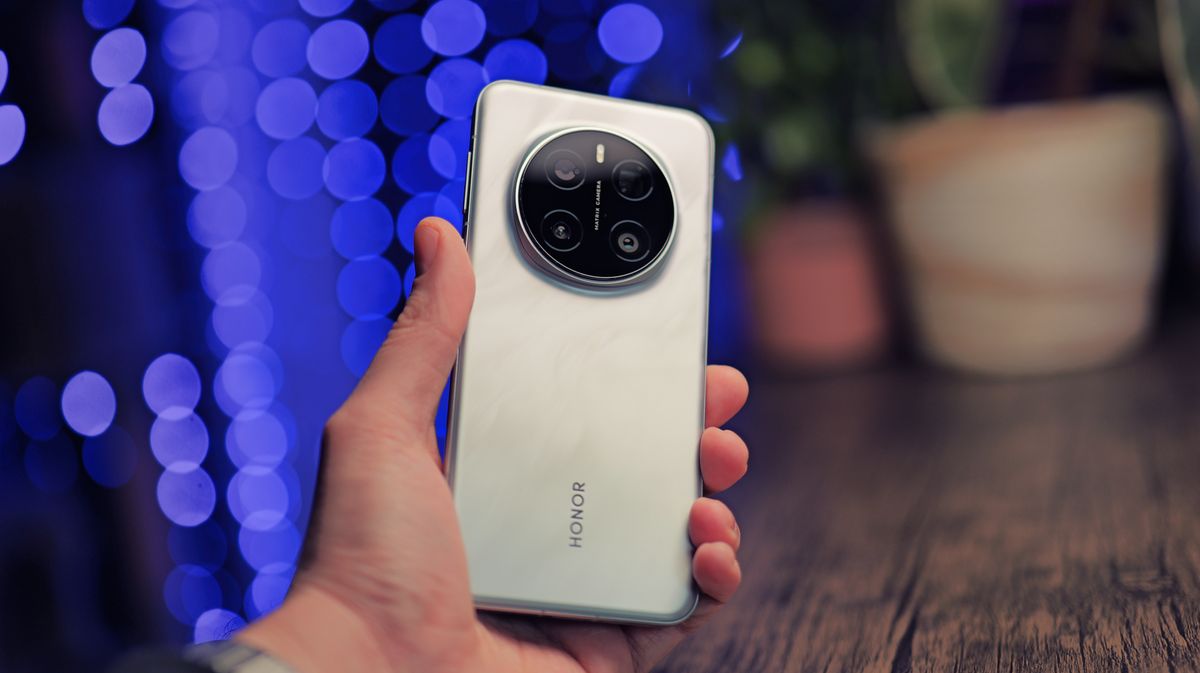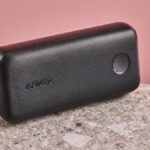Honor Magic 7 Pro review: Two-minute review
Honor’s Magic 6 Pro made a splash last year, debuting at the Mobile World Congress (MWC) expo in February with a massive battery, a unique camera system, and some novel software features. Now, the brand is back with its flagship offering for 2025, and it’s hoping to one-up itself in every department.
The Honor Magic 7 Pro has adopted a more boxy design for 2025, as is the trend, and it now has flat side rails and subtle symmetrical ‘micro curves’ at the edge of its display. The camera bump is less outlandish, too, and the ‘squircle’ bezel has been toned down to make less of a statement. Overall, I think it’s an improvement.
The camera hardware is mostly the same, but the telephoto has a few more megapixels and can now get you even closer to distant subjects. These cameras can take fantastic photos, but the image processing is a little inconsistent, and I got more blurry images than usual. Hopefully, this will be tweaked in future firmware updates. The Studio Harcourt portrait mode, developed in collaboration with the legendary Paris photography studio, never failed to impress, at least.
The battery on this model is even larger than the one in the Magic 6 Pro, and this is easily one of the longest-lasting flagship phones I’ve tested. You can get two days on a full charge without trying particularly hard, and when it’s time to charge you can get topped up in a flash, with the Magic 7 Pro supporting up to 100W charging with a cable and 80W with the right wireless charger.
Performance is exceptional. You get the Snapdragon 8 Elite chip, plus a suite of software enhancements and an NPU (neural processing unit) co-processor to keep games running smoothly. Honor’s Magic OS 9 adds some useful features like Magic Portal, as well as relatively new AI features that have already become familiar favorites, like Circle to Search and Google Gemini.
Overall, this is a superb phone, with a great balance of specs and features that make it a pleasure to use. The software won’t be to everyone’s taste, and the camera could use some tweaking, but otherwise, this is easily one of the finest flagship phones available today.
Honor Magic 7 Pro review: Price and availability
- Costs £1,099.99
- Available in the UK and Europe, but not the US or Australia
The Honor Magic 7 Pro is available to order now in most regions. As usual, though, the list excludes the US and Australia, so our stateside readers will need to import if they want to get in on the action.
The Magic 7 Pro costs £1,099 in the UK, the exact same price as its predecessor. This means it’s more expensive than the Oppo Find X8 Pro and Apple iPhone 16 Pro, but a little cheaper than the Pro Max or Samsung Galaxy S24 Ultra. That said, the latter phone can currently be purchased for the same price, as it’s been on the market for a while.
Given such premium pricing, Honor will need to impress on all fronts if it’s to remain competitive, and thanks to a pretty stacked spec sheet it could well justify that lofty sum. Plus, Honor always has bundle offers on its devices, so nabbing a few freebies could make the price more palatable.
Honor Magic 7 Pro review: Specs
Here’s a look at the Honor Magic 7 Pro’s key specs:
| Header Cell – Column 0 | Honor Magic 7 Pro |
|---|---|
| Dimensions | 162.7 x 77.1 x 8.8 mm |
| Weight | 223g |
| OS | MagicOS 9, based on Android 15 |
| Display | 6.8-inch OLED, 120Hz |
| Resolution | 2800 x 1280 pixels |
| Chipset | Qualcomm Snapdragon 8 Elite |
| RAM | 12GB |
| Storage | 512GB |
| Battery | 5,850mAh |
| Rear cameras | 50MP (f/1.4-2.0) main, 50MP (f/2.0) ultra-wide, 200MP (f/2.6) telephoto |
| Front camera | 50MP (f/2.0) |
Honor Magic 7 Pro review: Design
- Velvety-feeling matte glass back
- Breeze Blue, Black, and Lunar Shadow Grey options
- IP68/IP69 dust- and water-resistant
The Honor Magic 7 Pro follows the recent design trend that we’ve seen with devices like the Vivo X200 Pro and Oppo Find X8 Pro. It ditches the lateral curves of its predecessor in favor of a boxier design. The side rails are completely flat, with beveled edges, while the front and back are mostly flat, with symmetrical ‘micro curves’ on all sides.
The result is a phone that feels a little thicker than Magic 6 Pro, but at the same time it feels premium and confidence-inspiring. It’s a similar size to its predecessor, just less curvy, and if you’ve used any other recent Android flagship, you’ll feel right at home.
The global version is available in three colorways: Breeze Blue, Black and Lunar Shadow Grey. There are no vegan leather variants this time around, with all options featuring a velvety-feeling matte glass rear. The Lunar Shadow Grey option is the most striking in my opinion, with a marble-like texture running across the back panel that becomes more visible as the light catches it.
There’s still a large circular and centrally-placed camera island, and it’s still surrounded by a ‘squircle’-shaped bezel. However, this time the bezel is decidedly more circular, and it looks a little less outlandish than the Magic 6 Pro did.
The Honor Magic 7 Pro is rated IP68/IP69 for dust and water resistance, which means that as well as being able to handle submersion in freshwater, it can also withstand jets of hot water up to 176F / 80C. I’m not sure when that would ever come in useful, but hey, if you want to scroll Instagram in the shower, your phone should survive it.
Honor Magic 7 Pro review: Display
- 6.8-inch quad-curved 120Hz OLED display
- 4320Hz PWM dimming
- 5000 nits peak brightness
The Honor Magic 7 Pro has a 6.8-inch display with a dynamic refresh rate that can shift from 1Hz to 120Hz as needed. It’s a mostly flat panel, and the curves only start around the bezels of the display. The result is a screen that resembles an over-filled glass of water.
I’ve never been a huge fan of curved screens – they can invite accidental touches, and cause odd reflections and color shifts at the edges. There’s no denying that they feel nice under your fingertips when using gesture controls, though. These new ‘micro curve’ displays offer the best of both worlds, as you get the smooth feel of a curved display without the usual drawbacks. I’m a convert.
The display is covered with Honor’s NanoCrystal Shield glass, and after spending months with the Honor Magic 6 RSR (that’s the Porsche Design version of the Magic 6 Pro) last year, I’m confident in saying it’s one of the most scratch-resistant coatings in the business. It’s also supposedly 10 times more drop-resistant than traditional glass screens, and while I haven’t tested that, it’s good to know, especially as there’s no case included in the box.
A new addition to this model is a layer of circular polarization, which makes the screen slightly less reflective and is easier on the eyes. In theory, according to Honor, it can reduce eye fatigue by up to 16%.
When it comes to brightness, the Honor Magic 7 Pro has lumens to spare. It can peak at a whopping 5000 nits in certain conditions, which means HDR content looks exceptional, and you’ll never have trouble seeing it.
As usual, the brand has put plenty of effort into eye-care features. The PWM (pulse-width modulation) dimming rate is one of the highest I’ve ever seen, topping out at 4320Hz. You’ll never have to worry about flicker on this panel, and if that’s not enough you can activate eye comfort and low-blue-light modes to keep your peepers feeling fresh.
There’s a 3D ultrasonic fingerprint sensor under the display, and a pill-shaped camera cutout housing a 3D face unlock camera. Apparently, this is the first phone to come with both, and it’s very convenient. I especially like being able to log into banking apps using my face, and for me that’s worth the slightly larger camera cutout.
Honor Magic 7 Pro review: Cameras
- 50MP main (f/1.4-2.0)
- 200MP 3x telephoto (f/2.6)
- 50MP ultra-wide (f/2.0)
Most of the cameras on the Magic 7 Pro share their specifications with its predecessors’. The main camera still has a 50MP 1/1.3-inch sensor, and a mechanically adjustable aperture that shifts between f/1.4 and f/2. The ultra-wide and selfie cameras seem to be unchanged, too. Both have a 50MP resolution and a f/2 lens.
The telephoto, however, has changed more significantly. The Magic 6 Pro had a 180MP 2.5x optical zoom telephoto snapper, while the Magic 7 Pro upgrades that to a 200MP unit with a 3x lens. It’s one of the largest telephoto sensors on the market at 1/1.4-inch, and it’s also one of the fastest telephoto cameras, with an f/2.6 aperture.
These days I find myself using the telephoto camera on my smartphone as often, if not more, than the main camera, so I’m pleased to see telephoto specs that come close to matching those of the primary snapper.
I’m still not fully convinced that we need so many megapixels, though. The idea is that you can digitally zoom further with less of a drop in quality, as the high pixel count makes up the difference. In reality, though, it doesn’t seem to work so well.
I said the same thing about the Honor Magic 6 Pro, and while this model is an improvement (due to the longer optical focal length) zooming past 10x or so delivers middling and inconsistent results.
Honor’s solution to this is something called AI SuperZoom, and it kicks in beyond 30x zoom to clean up your images. At times the results can be quite impressive, but the downsides are plain to see. Images tend to have that watercolor-like effect to them, and sometimes details that don’t exist in reality are added in.
I’ve recently been shooting with the Oppo Find X8 Pro, which has an almost identical feature, but it seems to work a little better than Honor’s attempt. In fairness, Honor says this feature is in its infancy, and it will mature and improve over time. It’s also worth noting that it requires an internet connection to function, while Oppo’s equivalent is processed on-device.
Another new feature in the camera department is the addition of the Studio Harcourt portrait styles that we first saw on the Honor 200 Pro. If you like taking portraits, this is a serious upgrade. The color tuning and blur effects are just as stunning here, and they’re only enhanced further by the higher-fidelity optics. The only downside is that, as on the 200 Pro, the feature is restricted to the main and telephoto cameras, so you can’t use these effects on your selfies.
All in all, this is a very capable camera system, and it can deliver outstanding shots in all lighting conditions. When it hits, it’s among the best camera systems on the market, but it’s not the most consistent.
Maybe it’s just the pre-release software on the phone I’ve been testing, but I got a lot more blurry shots than I’m used to, and the image processing often pushed the sharpening too far, while blues and greens became over-exaggerated, even when using the Natural picture style.
These problems are all fixable, and I hope we see them addressed in future firmware updates. As it stands, the hardware is impeccable, but the inconsistent processing sometimes leaves you guessing as to how your photos will turn out.
Honor Magic 7 Pro review: Camera samples
Honor Magic 7 Pro review: Performance and software
- Snapdragon 8 Elite chipset
- 12GB RAM and 512GB storage
- Magic OS 9, based on Android 15
The Honor Magic 7 Pro is powered by Qualcomm’s most powerful chipset, the Snapdragon 8 Elite, so you would expect impressive performance. There’s only one configuration available on the global market, which comes with 12GB of RAM and 512GB of storage, which should be more than enough to satisfy most users.
Honor has taken things a step further with this phone by utilizing the power of its onboard NPU to further improve performance. The phone has something called an AI Predictive Scheduling Engine, and exactly what that does is a little above my comprehension level, but I think it’s a bit like DLSS on a gaming PC.
All you need to know is that, with the aid of some new features in the game overlay, you can achieve better image fidelity and higher framerates without adding additional load to the GPU. This means that you can game at higher settings, with less battery drain and lower temperatures.
In practice, it seems to work exactly as advertised. I played Genshin Impact at maximum settings for a couple of hours, and the phone had no trouble maintaining a solid 60fps. It remained shockingly cool under the pressure – cooler to the touch than even the gaming-specific ROG Phone 9 Pro, in fact.
The gaming experience is also enhanced by a very capable set of speakers. They might be the most bassy speakers ever to grace a smartphone, thanks to an integrated subwoofer and ultra-large sound cavity design, and they really add some oomph to in-game sound effects.
The Magic 7 Pro runs Magic OS 9, a highly customized version of Android 15, and it’s a bit divisive. Personally, I’ve become quite fond of Magic OS, but it’s a very different experience from stock Android. The notifications shade and quick settings menu are split, like they are on iOS, and navigating the system can be a little challenging if you’re coming from a phone that offers a more traditional Android experience, like a Google Pixel.
Aside from the layout changes, Honor has heaped on plenty of extra functionality. My personal favorite is Magic Portal, which allows you to select text or an image on your screen and drag it into another app for quick sharing or searching. This feature is now even easier to access, as you can circle things with your knuckle to quickly select them.
You also get plenty of AI-powered features, of course. There’s nothing too novel here, but it’s all pretty useful. There’s an AI translator, the ability to format and transcribe notes with AI, and an array of AI-powered image-editing tools. At some point soon the phone will also use AI to automatically protect you from deepfake video chats – I can’t say I’ve ever received one, but the extra peace of mind is always nice.
Also new this year is the inclusion of Circle to Search and Google Gemini as the default voice assistant. It’s getting to the point where most Android phones come with these features, but they’re still worth mentioning because they’re great, and I very much miss them when they’re not there.
Honor Magic 7 Pro review: Battery
- 5,850mAh silicon-carbon battery
- 100W wired charging
- 80W wireless charging
There’s a lot to love about the Honor Magic 7 Pro, but for me, the best thing might be the battery life. I tested this phone after spending lots of time with the Vivo X200 Pro, which has a mammoth 6,000mAh battery, so I wasn’t expecting to be amazed by this slightly smaller 5,850mAh unit – but I was.
Honor has clearly optimized its software very well, and I was able to manage two days on a full charge without even trying. And I managed that more than once, and that’s with lots of screen time, navigating maps, shooting lots of photos, and streaming content. It’s just brilliant.
We’ve seen some Chinese manufacturers dial back their charging speeds for this generation, but not Honor. Here you get an impressive 100W wired charging rate, and a staggering 80W with Honor’s Wireless SuperCharger.
Unfortunately, there’s no charger in the box, but I happened to have the right kit to charge at max speed, and it makes living with this phone extremely convenient. If you have the requisite charger, a wired charge from flat to full takes less than 35 minutes, while a wireless charge can be achieved in less than 45 minutes.
Should you buy the Honor Magic 7 Pro?
| Attributes | Notes | Rating |
|---|---|---|
| Value | The Magic 7 Pro is more expensive than the Oppo Find X8 Pro and iPhone 16 Pro, but a little cheaper than the 16 Pro Max or Samsung Galaxy S24 Ultra. | 3 / 5 |
| Design | The “squircle” bezel might divide opinions, but otherwise, this phone is rugged, attractive and a delight to hold. | 4 / 5 |
| Display | The Magic 7 Pro’s display is bright, vivid, and highly scratch-resistant. There are more eye-protection measures than the competition offers, too. | 5 / 5 |
| Performance | Not only do you get one of the fastest chipsets on the market, but it runs faster, cooler, and longer thanks to Honor’s NPU co-processor. | 5 / 5 |
| Software | Honor’s software won’t be to everyone’s taste, but it’s packed with useful features. | 3 / 5 |
| Battery | Simply put, the Honor Magic 7 Pro is the longest-lasting Android flagship around. It charges extremely quickly, too. | 4 / 5 |
Buy it if…
Don’t buy it if…
Honor Magic 7 Pro review: Also consider
The Honor Magic 7 Pro is an excellent all-rounder with a brilliant camera, but the competition is fierce. If you’re not sure this is the handset for you, it’s worth checking out these competitors.
| Header Cell – Column 0 | Honor Magic 7 Pro | Oppo Find X8 Pro | iPhone 16 Pro |
|---|---|---|---|
| Price: | £1,099 / €1,299 | £1,049 / AU$1,799 | $1,199 / £1,199 / AU$2,149 |
| Display: | 6.8-inch OLED | 6.78-inch OLED | 6.9-inch OLED |
| Cameras: | 50MP wide; 50MP ultra-wide; 200MP 3x zoom | 50MP main; 50MP ultrawide; 50MP 3X zoom; 50MP 6x zoom | 48MP main; 48MP ultrawide; 12MP 5x zoom |
| Processor: | Qualcomm Snapdragon 8 Elite | MediaTek Dimensity 9400 | Apple A18 Pro |
| Battery: | 5,850mAh | 5,910mAh | 4,685mAh |
How I tested the Honor Magic 7 Pro
- Review test period: two weeks
- Testing included: everyday use including web browsing, social media, photography, video calling, gaming, streaming video, music playback
- Tools used: Geekbench 6, 3DMark, GFXBench, native Android stats, Honor 100W charger, and wireless SuperCharge stand
I put my SIM card into the Honor Magic 7 Pro and lived with it as my main phone for around two weeks before reaching any conclusions. I used it exactly as I would any other phone, taking lots of photos, gaming, messaging, working, streaming video, and navigating with Google Maps and Waze.
I also compared the experience of playing graphically challenging games like Zenless Zone Zero, Genshin Impact, and PUBG Mobile to my experience with other Android flagships like the Oppo Find X8 Pro, Vivo X200 Pro, and Samsung Galaxy S24 Ultra. I also ran multiple benchmarks on the handset using 3DMark, GFXbench, and Geekbench.
I assessed the battery performance based on my real-world usage and charging times were measured using an official Honor 100W wall adapter and cable. I also tested the wireless charging capabilities with Honor’s Wireless 100W SuperCharge stand.
Read more about how we test
First tested January 2024
Read the full article here














